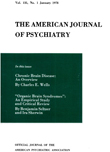A Preliminary Evaluation of Magnesium Pemoline in Chronic Schizophrenic Patients
Abstract
Magnesium pemoline was investigated for its possible beneficial effects upon intellective and memory functioning and clinical psychiatric status of chronic schizophrenic patients. Sixteen patients received magnesium pemoline for eight weeks in dosages beginning at 12.5 mg. daily and increasing after two weeks to 25 mg. daily. Four patients received magnesium pemoline at these same dosages in addition to already effective antipsychotic medications. Eight subjects from the larger group received a second fourweek trial of magnesium pemoline; four of these patients received 100 mg. daily and the other four were given 12.5 mg. every other day.
All study subjects were evaluated by means of repeated psychological and psychiatric procedures as well as by extensive laboratory examinations and special tests for cardiac and dermatologic effects.
Results suggested that magnesium pemoline in dosages of 12.5 mg. to 25 mg. daily has no therapeutic efficacy in chronic schizophrenic patients. Possible antidepressant activity was suggested at a dosage of 12.5 mg. every other day, but this was based on data for only four subjects and requires replication in a larger and more appropriate patient group. Addition of magnesium pemoline to an already effective regimen of antipsychotic drugs produced no further significant benefit.
The effect of magnesium pemoline upon intellective and memory functioning in chronic schizophrenic patients remains equivocal. Suggestion of possible slight enhancement of such function was seen with administration of 25 mg. daily, but even if this could be clearly corroborated the degree of change does not appear to be of real clinical significance in patients of this type.
With the exception of a transient rise in pulse rate and suggestion of some insomnia, evaluations for toxicity and side reactions were consistently negative at all dosages.
In summary, findings from these pilot investigations offer no support for further study of magnesium pemoline in chronic schizophrenic patients.
Access content
To read the fulltext, please use one of the options below to sign in or purchase access.- Personal login
- Institutional Login
- Sign in via OpenAthens
- Register for access
-
Please login/register if you wish to pair your device and check access availability.
Not a subscriber?
PsychiatryOnline subscription options offer access to the DSM-5 library, books, journals, CME, and patient resources. This all-in-one virtual library provides psychiatrists and mental health professionals with key resources for diagnosis, treatment, research, and professional development.
Need more help? PsychiatryOnline Customer Service may be reached by emailing [email protected] or by calling 800-368-5777 (in the U.S.) or 703-907-7322 (outside the U.S.).



